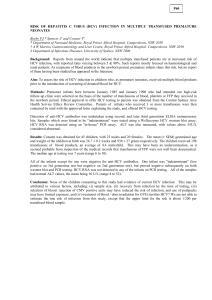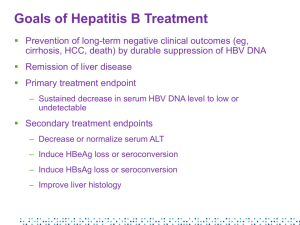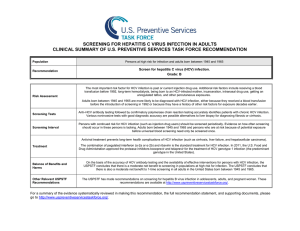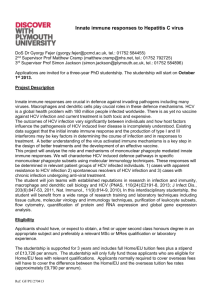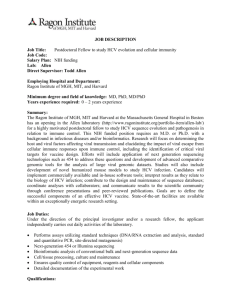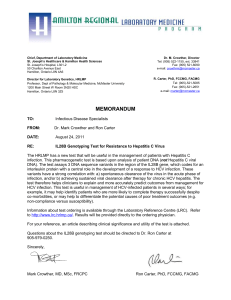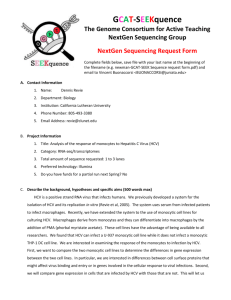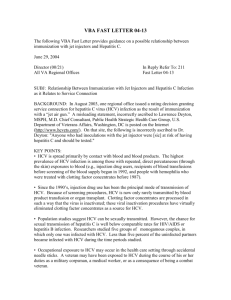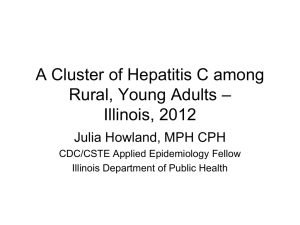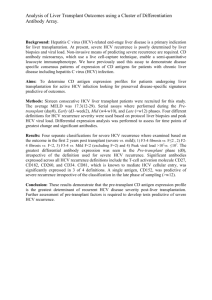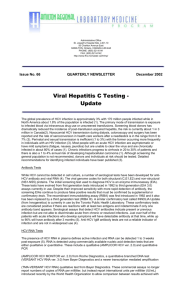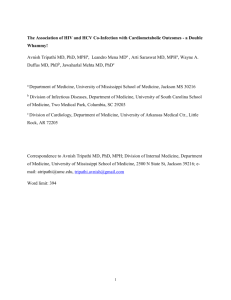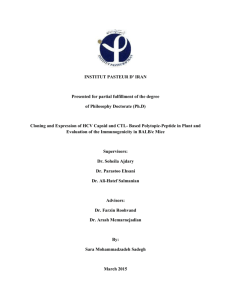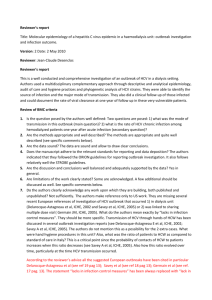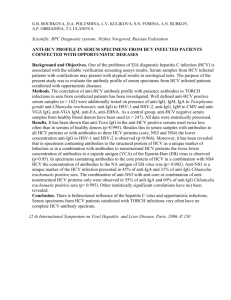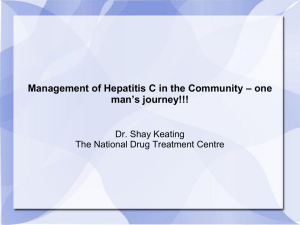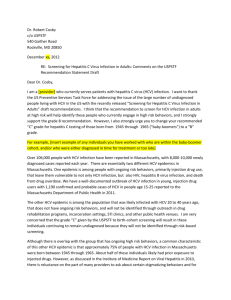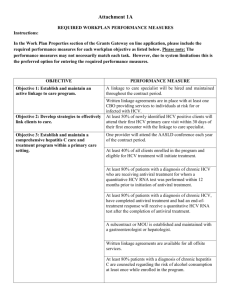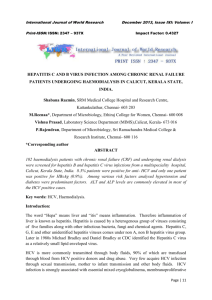17-How to write a study protocol_2011
advertisement
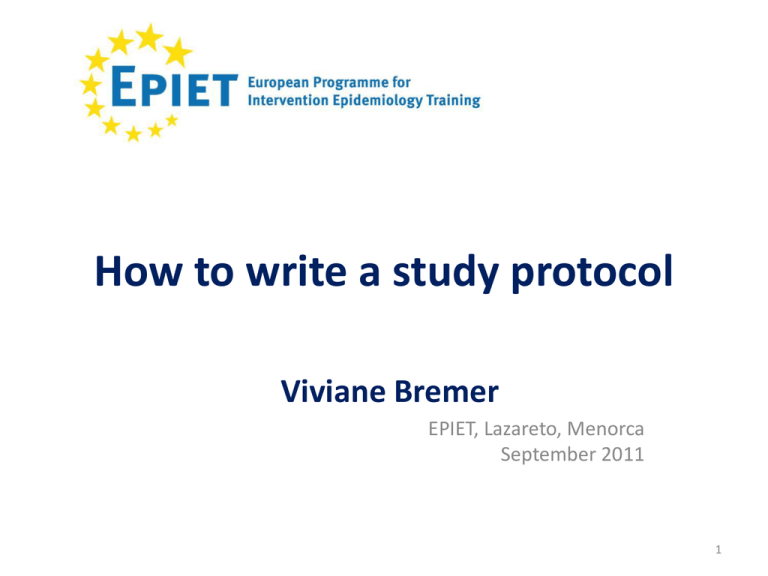
How to write a study protocol Viviane Bremer EPIET, Lazareto, Menorca September 2011 1 What is the study protocol? • Every step of a study • Answers relevant questions - public health problem important? - study question relevant to problem? - objectives consistent with study question? - study design achieves objectives? - sufficient power? - public health impact of the findings? 2 Why write a study protocol? • Check - if objectives can be achieved - feasibility of the study • Prevent failure to collect crucial information • Lays down the rules for all partners (quality) • Obtain approval of ethical committee(s) • Application for funds 3 Study protocol How to start ? • Formulate the research question • Get – good examples of protocols – ideas from similar published studies – ideas from colleagues • Use a checklist of items to include • Get the requested format (grant application) 4 Protocol outline 1. 2. 3. 4. 5. 6. 7. 8. 9. 10. Presentation Background and justifications Objectives Methods Ethical considerations Project management Timetable Resources References Appendices 5 1. Presentation • Title – short, accurate, concise • • • • Investigators Main centres Steering committee (scientific board) Summary of the protocol 6 2. Background and justification • Statement of problem, study justification importance of subject area • magnitude, frequency gaps in existing knowledge principal questions to be addressed contribution of results to existing knowledge use of results dissemination of results • Review relevant literature 7 3. Objectives • Should answer the study question • Should be S.M.A.R.T. – Specific – Measurable – Achievable/Accessible – Realistic/Relevant – Time-based/Timely 8 3. Objectives Principal objective • Must be achieved • Dictates design and methods Secondary objectives • Of interest, but not essential 9 Hypotheses • Translation of the objectives in terms that allow statistical testing 10 3. Objectives example • Non S.M.A.R.T objective – To identify risk factors for HCV infection Principal objective • To determine if sharing a haemodialysis machine with a HCV infected patient is a risk factor for HCV infection Secondary objective: • To identify failures in procedures designed to prevent cross-infection via haemodialysis machines 11 Hypothesis “The incidence of HCV infection in haemodialysis patients is higher in patients sharing machines with HCV infected patients than in patients not sharing machines with an HCV infected patients” 12 Protocol outline 1. Presentation 2. Background and justifications 3. Objectives 4. Methods 5. Ethical considerations 6. Project management 7. Timetable 8. Resources 9. References 10. Appendices 13 4. Methods • Procedures to achieve objectives – what will be done? – how? • Information used to judge validity 14 4. Methods • Study design cohort, case control, cross-sectional… brief justification • Study population definition selection criteria for inclusion and exclusion mechanisms of recruitment accessibility, follow-up, representativeness 15 4. Methods • Sampling design (ref: lecture sampling) frame: district, household, persons,… method: random, cluster, stratified,… randomisation procedures replacement procedures (in case of refusal) • Sample size (ref: lecture sample calculation) sample size, power calculations based on principal objective feasibility 16 Sample size e.g. Options for case-control study on sporadic campylobacter and food exposure Prevalence of exposure among controls Case: control ratio Alpha error/ power Odds ratio to detect Number of cases Number of controls 10% 1:2 5%/ 80% 2 223 446 10% 1:2 5%/ 80% 3 81 162 10% 1:2 5%/ 80% 4 48 96 10% 1:2 5%/ 80% 5 34 68 10% 1:2 5%/ 80% 6 27 54 17 4. Methods • Selection and definition exposures: risk factors, protective factors, confounding factors outcomes: definition of case, of control group • Items to be measured – scales used • e.g: legionella <=> car driving - Driving exposure: definition, quantification, categories - Legionella infection: case definition, control group definition 18 CC study of sporadic cases of Salmonella Enteritidis infections • Exposure – consumption of custard • Case – a person living in South-West Wales with a laboratory confirmed infection due to S. Enteritidis in June and July 2011 • Case finding – through Public Health Laboratory; weekly notifications • Control – persons living in SW Wales in same neighborhood as cases • Control finding – random selection of people using telephone directory 19 Methods Data analysis plan • Structured in terms of objectives • Hypotheses tested, dummy tables Comparison of groups risk factors protective measures Assessment of dose-response relationship for key exposures Assessment of possible confounding factors / effect modifiers • Statistical tests used, adjustment, stratification 20 Methods Data analysis plan • Define – indicators you will need to reach objectives – data you will need to collect • Better estimates of sample size for analysis of sub-groups 21 Methods Data analysis Dummy table: Food specific attack rates of Salmonella infection in a day care centre, Paris, May 2009 ill n total n AR % RR 95%CI ice-cream yes ice-cream no fruit cake yes fruit cake no pudding pudding yes no 22 4. Methods Data collection • How interview, observation, record review • By whom interviewers: selection, training level of supervision • Tools (ref: lecture “questionnaire design”) questionnaires, recording materials questionnaires: self or interviewer administered, face-to-face or telephone interview • Blind data collection • Procedures for taking samples 23 4. Methods Data handling • Coding (anonymisation) during data collection, afterwards? by whom? • Processing software, hardware entry • during the study, afterwards? • single entry, double entry? • Validation and data cleaning 24 4. Methods Pilot studies, pre-testing • No study without pre-test Feasibility of sampling Data collection, measurement methods Questionnaire • Describe how to test 25 4. Methods Limitations • Identification of potential sources of biases selection bias information bias misclassification bias interviewer bias • How to deal with them possibilities for correcting how they will affect the results 26 Protocol outline 1. Presentation 2. Background and justifications 3. Objectives 4. Methods 5. Ethical considerations 6. Project management 7. Timetable 8. Resources 9. References 10. Appendices 27 5. Ethical considerations • Informed consent – translated in local lay language • Confidentiality – coding data collection instruments without identifier • Data storage and protection • Ethics committee 28 6. Project management • Participating institutes and persons • Responsibilities and tasks of each partner • Data ownership • (Authorship) 29 7. Timetable Planning/organisation of the study • questionnaire design, recruitment, purchases • permission • obtain funding Pilot study • time to do adjustments Final study • data collection • analysis • presentation of results and write up 30 8. Resources • Extent of this section depends on target audience • Specify available sources requested sources • Keep budget reasonable detailed well justified 31 9. References • Limit number of references to key articles • Follow recommended style • Vancouver www.library.soton.ac.uk/infoskills/vancouver.shtml www.transfusion.ca/new/bulletin/vancouver-style.html 32 10. Appendices • Methodological appendices • List of definitions • Questionnaires • Introductory letters to study participants • Informed consent forms ….. 33 Common problems • Too ambitious: too many questions • Insufficient attention to literature • Poor justification why is it important to answer this question? what impact does it have on public health? • Poorly formulated objectives • Inappropriate analysis • Inadequate description • Absence of pilot 34 Your task next week • Create a study protocol in small groups • Present it to the plenary • Read the references during the weekend
